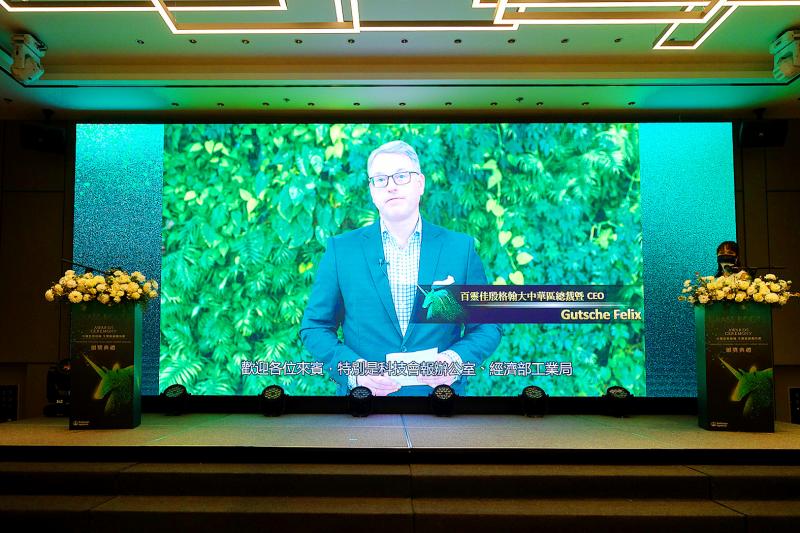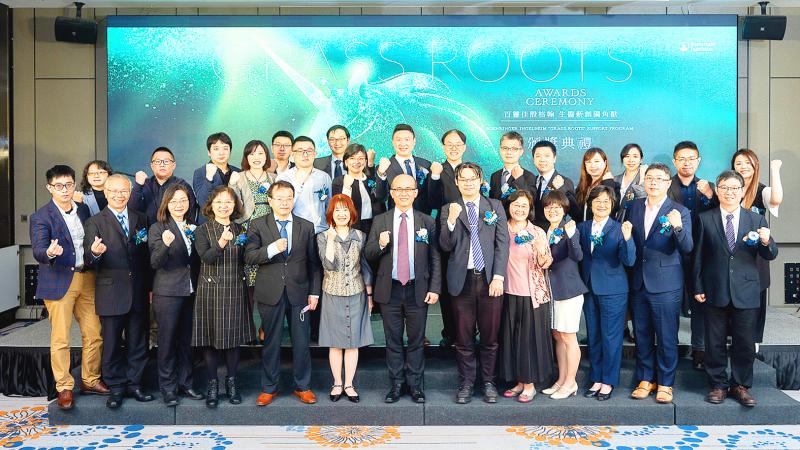Boehringer Ingelheim Taiwan Ltd yesterday awarded six research teams and pharmaceutical start-ups to support their efforts in innovation as their work shows great potential for satisfying unmet medical needs, it said.
The awards are part of its parent company’s “Grass Roots Initiative” program, which enables the study of emerging science by championing early-stage life-science companies, managing director James Chiou (邱建誌) told an award ceremony in Taipei.
The six teams were selected by the company’s headquarters out of 169 companies that applied for the reward, Chiou said.
Through the program, Boehringer Ingelheim not only encourages innovation in medicine, but also gets a chance to learn about start-ups with great potential firsthand, giving it an opportunity to partner with new companies and enhance its research and development resources, Chiou said.
One team headed by Sun Wei-lun (孫偉倫), a postdoctoral researcher at Taipei Medical University, succeeded in embedding a section of a human cancer cell on an integrated circuit chip specially made to fit the cell, she said.
When the chip is charged with electricity, the cell would react, meaning that a chip embedded with such a cell could be used to test different drugs to see which works best to treat various types of cancer, Sun said.
Although the team has not concluded whether testing a cell on the chip would work in exactly the same way as administering a drug to a cancer cell in a human body, the cell-on-chip system would be better than using immortalized cancer cells such as in conventional studies, as the chip system would provide “fresher” cells, Sun said.
Every chip could be personalized, and it takes about three days to extract a cell and place it on the chip, Sun said, adding that the chips are provided by National Tsing Hua University.
Sun’s team tested its technology in a trial in which patients with lung cancer are given specific drugs, while their cells on the chips are also given the same treatment, and the team observes whether the results are comparable, Sun said.
The innovation is likely to change medicine development, she said.
Sun plans to set up her own company and would be interested in cooperating with pharmaceutical firms, she said.
Another team led by Yang Kai-chien (楊鎧鍵), an associate professor of National Taiwan University’s pharmacology graduate institute, discovered a new treatment for fibrosis.
The team found that the TXNDC5, an endoplasmic reticulum resident protein, plays a key role in fibrotic scarring, Yang said.
Unlike pharmaceutical companies that aims to cure fibrosis by giving patients compound drugs, Yang’s team developed a DNA aptamer that can bind to TXNDC5, thus curbing the fibrosis-triggering protein’s activity, he said.
As the TXNDC5 had been found active in the development of fibrosis in many organs — pulmonary fibrosis, cardiac fibrosis and kidney fibrosis — the potential of the treatment is great, he said.
Like Sun, Yang also plans to set up his own company, he said.
Annji Pharmaceutials Co Ltd is also focusing on fibrosis treatment. It developed an experimental drug, dubbed AJ303, and aims to obtain US regulators’ approval to conduct a phase-one human trial by the end of the year, president and CEO Wendy Huang (黃文英) said.
The company chose to conduct human tests in the US to include multiethnic participants so that its drug could be used worldwide, Huang said.
“As Boehringer Ingelheim is the provider of the standard treatment for pulmonary fibrosis, we feel honored to obtain its recognition,” Huang said, adding that she hopes there would be opportunities for further collaboration.
JelloX Biotech Inc developed a 3D imaging technology for biopsies, which would help doctors see tumors better and more accurately prescribe medicine, CEO Lin Yen-yin (林彥穎) said.

“Although it was the first time that the start-up-supporting program was introduced in Taiwan, our headquarters said it was impressed with the overall quality of work made by these Taiwanese applicants,” Chiou said.
While the program only accepted work in six areas — digital health, regeneration medicine, cancer, autoimmune disease, fibrosis and gene therapy — the local unit found that among all the projects by the 169 local applicants, the ratio of work in cancer or fibrosis was comparatively high, Chiou said.
“It is understandable that many companies are focusing on cancer treatment, as cancers receive great attention worldwide, but I was a bit surprised to know that so many local companies or teams devote themselves to fibrosis treatment, as the number of patients with fibrosis is not particularly high in Taiwan,” Chiou said.
Boehringer Ingelheim Taiwan’s parent company talked with the six award-winning teams and gave them advice about business models, patent protection and sustainable development, while it is also to evaluate whether to pursue further collaboration with the start-ups, Chiou said.
The company has acquired treatment methods from local companies in the past, he added.
Boehringer Ingelheim is a research-driven company, devoted to innovative medicine and supports young life-science companies by providing mentoring, support and valuable resources to help them progress, Boehringer Ingelheim China president and CEO Felix Gutsche said in a statement.

